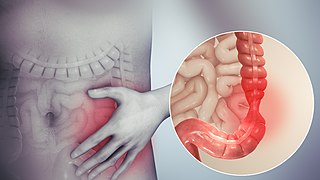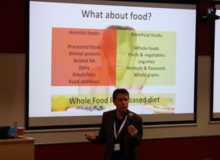
Gastroenterology is the branch of medicine focused on the digestive system and its disorders. The digestive system consists of the gastrointestinal tract, sometimes referred to as the GI tract, which includes the esophagus, stomach, small intestine and large intestine as well as the accessory organs of digestion which include the pancreas, gallbladder, and liver.

Crohn's disease is a type of inflammatory bowel disease (IBD) that may affect any segment of the gastrointestinal tract. Symptoms often include abdominal pain, diarrhea, fever, abdominal distension, and weight loss. Complications outside of the gastrointestinal tract may include anemia, skin rashes, arthritis, inflammation of the eye, and fatigue. The skin rashes may be due to infections as well as pyoderma gangrenosum or erythema nodosum. Bowel obstruction may occur as a complication of chronic inflammation, and those with the disease are at greater risk of colon cancer and small bowel cancer.

Ulcerative colitis (UC) is one of the two types of inflammatory bowel disease (IBD), with the other type being Crohn's disease. It is a long-term condition that results in inflammation and ulcers of the colon and rectum. The primary symptoms of active disease are abdominal pain and diarrhea mixed with blood (hematochezia). Weight loss, fever, and anemia may also occur. Often, symptoms come on slowly and can range from mild to severe. Symptoms typically occur intermittently with periods of no symptoms between flares. Complications may include abnormal dilation of the colon (megacolon), inflammation of the eye, joints, or liver, and colon cancer.

Irritable bowel syndrome (IBS) is a functional gastrointestinal disorder characterized by a group of symptoms that commonly include abdominal pain, abdominal bloating and changes in the consistency of bowel movements. These symptoms may occur over a long time, sometimes for years. IBS can negatively affect quality of life and may result in missed school or work or reduced productivity at work. Disorders such as anxiety, major depression, and chronic fatigue syndrome are common among people with IBS.

Inflammatory bowel disease (IBD) is a group of inflammatory conditions of the colon and small intestine, with Crohn's disease and ulcerative colitis (UC) being the principal types. Crohn's disease affects the small intestine and large intestine, as well as the mouth, esophagus, stomach and the anus, whereas UC primarily affects the colon and the rectum.
Prebiotics are compounds in food that foster growth or activity of beneficial microorganisms such as bacteria and fungi. The most common environment concerning their effects on human health is the gastrointestinal tract, where prebiotics can alter the composition of organisms in the gut microbiome.
Leaky gut syndrome is a hypothetical and medically unrecognized condition that is distinct from the scientific phenomenon of increased intestinal permeability commonly known as "leaky gut". Claims for the existence of "leaky gut syndrome" as a distinct medical condition come mostly from nutritionists and practitioners of alternative medicine. Proponents claim that a "leaky gut" causes chronic inflammation throughout the body that results in a wide range of conditions, including myalgic encephalomyelitis/chronic fatigue syndrome, rheumatoid arthritis, lupus, migraines, multiple sclerosis, and autism. There is little evidence to support this hypothesis.
The specific carbohydrate diet (SCD) is a restrictive diet originally created to manage celiac disease; it limits the use of complex carbohydrates. Monosaccharides are allowed, and various foods including fish, aged cheese and honey are included. Prohibited foods include cereal grains, potatoes and lactose-containing dairy products. It is a gluten-free diet since no grains are permitted.
The British Society of Gastroenterology (BSG) is a British professional organisation of gastroenterologists, surgeons, pathologists, radiologists, scientists, nurses, dietitians and others amongst its members, which number over 3,000. It was founded in 1937, and is a registered charity. Its offices are in Regent's Park, London.
FODMAPs or fermentable oligosaccharides, disaccharides, monosaccharides, and polyols are short-chain carbohydrates that are poorly absorbed in the small intestine and ferment in the colon. They include short-chain oligosaccharide polymers of fructose (fructans) and galactooligosaccharides, disaccharides (lactose), monosaccharides (fructose), and sugar alcohols (polyols), such as sorbitol, mannitol, xylitol, and maltitol. Most FODMAPs are naturally present in food and the human diet, but the polyols may be added artificially in commercially prepared foods and beverages.

Emeran Anton Mayer is a gastroenterologist, lecturer, author, editor, neuroscientist, documentary filmmaker and a professor in the Departments of Medicine, Physiology and Psychiatry at the David Geffen School of Medicine at UCLA. He is a pioneer of medical research into brain gut interactions

The intestinal mucosal barrier, also referred to as intestinal barrier, refers to the property of the intestinal mucosa that ensures adequate containment of undesirable luminal contents within the intestine while preserving the ability to absorb nutrients. The separation it provides between the body and the gut prevents the uncontrolled translocation of luminal contents into the body proper. Its role in protecting the mucosal tissues and circulatory system from exposure to pro-inflammatory molecules, such as microorganisms, toxins, and antigens is vital for the maintenance of health and well-being. Intestinal mucosal barrier dysfunction has been implicated in numerous health conditions such as: food allergies, microbial infections, irritable bowel syndrome, inflammatory bowel disease, celiac disease, metabolic syndrome, non-alcoholic fatty liver disease, diabetes, and septic shock.
David T. Rubin is an American gastroenterologist and educator. He is the Joseph B. Kirsner Professor of Medicine at the University of Chicago, where he is also the Chief of the Section of Gastroenterology, Hepatology and Nutrition. He also serves as the Co-Director of the Digestive Diseases Center.
A low-FODMAP diet is a person's global restriction of consumption of all fermentable carbohydrates (FODMAPs), recommended only for a short time. A low-FODMAP diet is recommended for managing patients with irritable bowel syndrome (IBS) and can reduce digestive symptoms of IBS including bloating and flatulence.
Maria Teresa Abreu is an American gastroenterologist with a focus on inflammatory bowel disease. She was inducted into the Academy of Science, Engineering and Medicine of Florida for "her research in advancing understanding of therapeutic drug monitoring genotype–phenotype associations in inflammatory bowel diseases."
Shomron Ben-Horin is an Israeli physician, a co-founder & Chief Medical Officer of Evinature, and professor of medicine at the Tel-Aviv University.
William John Bulsiewicz better known as Dr. B., is an American board-certified gastroenterologist and author known for his exploration of the relationship between the gut microbiome and plant-based nutrition.
Gemma Newman known as the Plant Power Doctor is a British medical doctor, nutritionist, author and advocate of whole food plant-based nutrition.
Megan Rossi is a dietitian, nutritionist and author specialising in the microbiome. Her PhD in gut health received the Dean's Award top 5% for Outstanding Research Higher Degree.
Prof. Richard Pollok is a British gastroenterologist and academic. He is a Professor of Practice in Gastroenterology and Gastrointestinal Infection at St George's, University of London. He also serves as a consultant physician at St George's University Hospitals NHS Foundation Trust and is a visiting professor at Imperial College London. His research primarily revolves around inflammatory bowel disease (IBD) and gastrointestinal infection.







